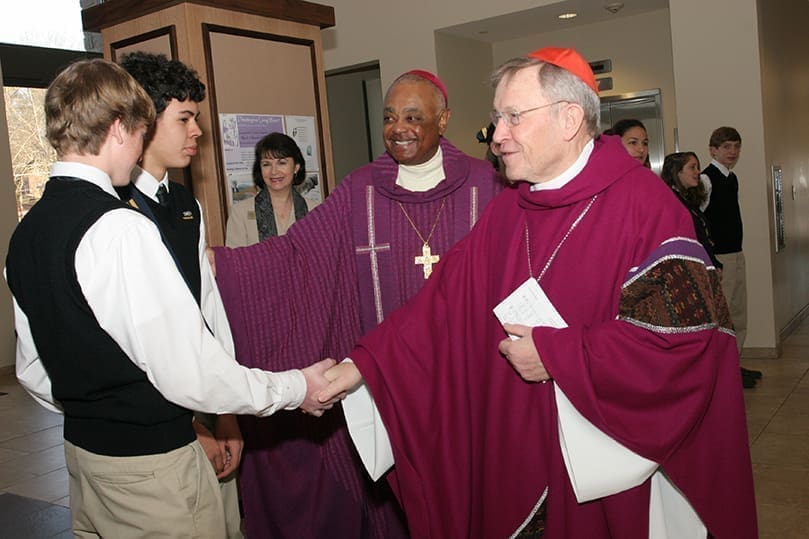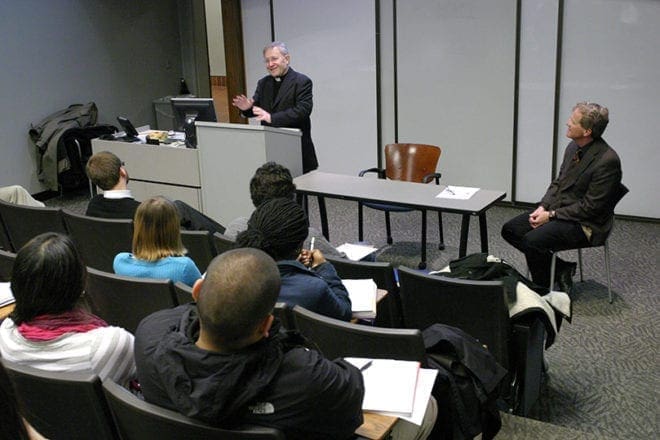 Photo By Michael Alexander
Photo By Michael AlexanderAtlanta
Cardinal Brings Vivid Lesson To Catholic Studies Class
By ANDREW NELSON, Staff Writer | Published March 18, 2010
Peering over the podium at a roomful of some 30 university students, Cardinal Walter Kasper fielded a range of questions from Communion for divorced and civilly remarried Catholics and reform in the church to reaching out to other faiths.
The cardinal, one of the leading theologians in the church, told the students at Emory University that hope is the glue that holds people together.
“Hope today is a scarcity in our world. Hold up the torch of hope in the world, it is a very, very important thing. Without hope between people, no church, no faith community will survive.”
Cardinal Kasper is the Catholic Church’s leader in its outreach to other Christians, Jews and other faiths. He spent a week at Emory University, from Sunday, Feb. 28, to Thursday, March 4. He met with Jewish leaders and students, visited the grave of Dr. Martin Luther King Jr. and gave a lecture at Glenn Memorial Chapel. He also celebrated Masses at Sacred Heart Church and with students at Emory, Marist and Immaculate Heart of Mary schools.
“We can look with hope to the future and give witness to our Catholic faith and work together with other faiths because there are big challenges (in) the world today,” he said in an interview. “Collaboration is so needed in this world to give this witness. Reconciliation, forgiveness and collaboration are still possible.”
In a Modern Catholicism class at Emory University, students had the floor as Cardinal Kasper, dressed in a Roman collar and with a large cross around his neck, answered questions in heavily accented English. At ease in the class, he said the experience reminded him of the 25 years he spent as a university professor.
Brittany Whitmore, 21, a history and Spanish major, asked about his 1993 controversial pastoral letter allowing some divorced and civilly remarried Catholics in his diocese to receive Communion as long as they believed in good conscience their first marriage was invalid.
The cardinal said divorce is a big problem, with a growing number of people in this situation.
“Every pastor knows it,” he said.
He said the official teaching of the church is clear that divorced and remarried Catholics cannot receive Communion unless their first marriage is declared null in a church court, but as a bishop in Germany he worked with two other bishops to address the issue locally using a Catholic principle. But it was not met with enthusiasm by Vatican leaders, he said. The three bishops rescinded their provision as a result.
In the pastoral letter, the bishops had said a divorced Catholic must talk with his or her church pastor and listen to his conscience, he said. The pastoral response was to be considered on a case-by-case basis.
“It remains a strong pastoral problem,” he said.
“I think it was an awesome experience,” said Whitmore of the cardinal’s visit. “Not every class can we hear someone who has a firsthand account” of church history and the popes, she said.
Sophomore Mina Sardashti had a reason to ask about outreach by the church to Muslims. While she is a Christian, her father is Muslim.
“I think it’s an amazing opportunity. It is kind of exciting,” she said about questioning the cardinal.
In response, Cardinal Kasper said the dialogue with the Muslim community is at the “very beginning of the beginning.”
There is not the common religious heritage as there is with Christians and Jews, but there is the connection of being a monotheistic faith, he said. In Europe, there is the history of conflict and distrust of past wars between Christian and Muslims, he said.
But the talks must go on, he said. “There is no alternative.”
On the question of Catholics only receiving the Eucharist at Mass, Cardinal Kasper said he liked a custom of American Catholicism where non-Catholics come forward at Communion and receive a blessing instead. That has not been adopted in most places in Europe, he said, but it opens the doors for non-Catholics to be in what he called “spiritual communion” at Mass.

Professor of Philosophy Jack Zupko, bottom far right, sits with his students as Cardinal Walter Kasper, standing at the podium, serves as a guest speaker during Zupko’s Modern Catholicism class at Emory University, March 2. Photo By Michael Alexander
The exchange between students and the cardinal impressed the class instructors.
“It’s a wonderful moment in teaching” to have someone in the classroom whose writing students study, said Professor Jack Zupko. “His witness is very powerful.”
He said hearing the importance of establishing personal relationships in resolving ecumenical disputes was a new factor for him to consider.
Father Bryan Small, Catholic chaplain at Emory and co-instructor of the class, said the cardinal showed how he wrestles with contemporary issues.
“He really presents himself as a man of nuance” and not someone who simply repeats the easy answers, Father Small said. “It is a virtue.”
‘Ecumenism Is An Exchange Of Gifts’
Cardinal Kasper, who turns 77 this month, is president of the Vatican’s Pontifical Council for Promoting Christian Unity. Before that he served as bishop of Rottenburg-Stuttgart, Germany’s fourth-largest diocese, with more than 2 million Catholics. During his 10 years as residential bishop, Cardinal Kasper served the German bishops’ conference as vice chairman of the doctrinal commission and as chairman of the international church policy commission. He sat down to interviews with the Atlanta media, including The Georgia Bulletin.
Two years past retirement age, the cardinal said the pope told him to continue his role since he is in good health. But he said some of the tasks are becoming harder to do.
During his time as head of the council, Cardinal Kasper said great progress had been made between the Catholic Church and the Orthodox churches and between the Catholic Church and many of the Protestant churches.
Professor of philosophy Jack Zupko, seated far right, sits with his students as Cardinal Walter Kasper, standing at the podium, serves as a guest speaker during Zupko’s Modern Catholicism class at Emory University, March 2.
“We have to have a common witness. It is for the common good of the world. We can learn from each other. Ecumenism is an exchange of gifts,” he said.
With the Anglican community, Cardinal Kasper said he was disappointed that what started with “fruitful discussions” has stalled over the internal divisions in the Anglican community. But at a recent meeting with the archbishop of Canterbury, the two pledged to continue the talks. “We decided to go on. We are committed to this dialogue. We are not stopped by this crisis.”
“Harvesting the Fruits,” a book put out by Cardinal Kasper and his staff reviewed the past 40 years of official dialogue with Protestant churches.
“I myself was surprised how much we achieved. Much more than I thought. Of course, we did not achieve the full unity, but we made important and decisive steps in this common pilgrimage. This gives me a lot of satisfaction after 10 years of work,” he said.
All churches are confronted with so many common challenges, secularism, environmental peace, justice, hunger in the world and many other problems.
“Together, our Christian voice will be strong, if we stand together. And when we are divided, the churches, it is a scandal to the outside world,” he said.
Some are concerned that talks between different faiths can lead to a loss of the Catholic identity, he said.
“I think there must always be this tension. Be faithful to your own roots, to your own tradition, your own identity, but consider it as an open identity. Dialogue without giving up one’s own heritage so you can be enriched by this dialogue.”
He put concerns from the Jewish community about the possible canonization of Pope Pius XII, the Catholic leader during World War II, as a sign of a maturing relationship.
“There are crises, that is human life,” he said. “We have to work to overcome it.”
“There has grown up a lot of trust and friendship. We have large common fundamentals. We have good collaboration between us,” he said about Jewish and Catholic religious relations.
“Respect each other in our otherness,” he said.
While in Atlanta, Cardinal Kasper visited the grave of Dr. King.
“I think it is a sign of hope what he did and a strength of his faith also,” he said. “He did it as a believing man that God created all man in his image and likeness so everyone has the same dignity (despite) all the differences. It is a richness of humanity that we are not all the same, but (all have) the dignity.”